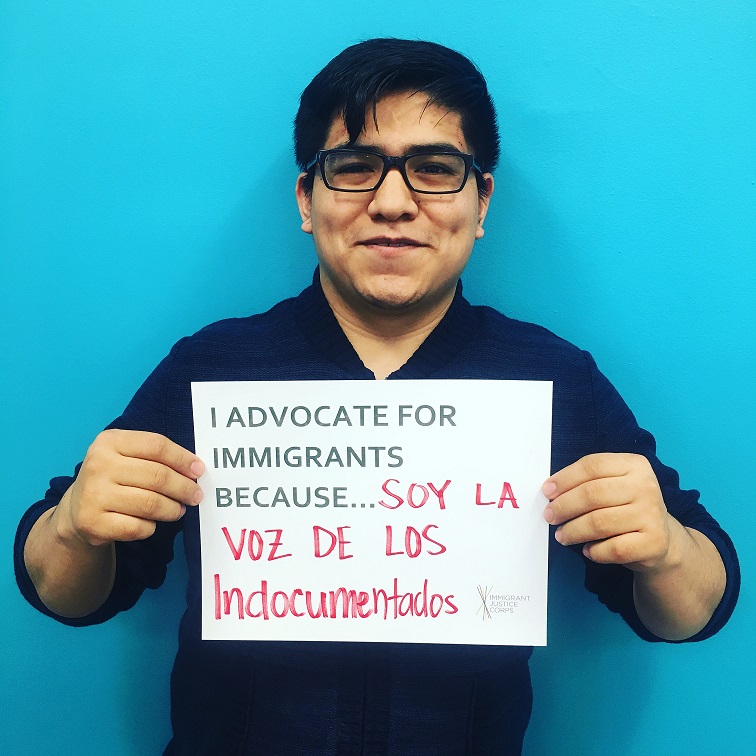21 June, 2019
Providing legal support to immigrants
Special Interest Programme / Partner story
Photo: © Immigrant Justice Corps
Some 65.3 million people were displaced globally in 2015, a number surpassing the post-World War II record.1
In 2017, this trend continued, with conflicts in Afghanistan, Iraq, South Sudan, Syria and Yemen driving hundreds of thousands from their homes. On the other side of the Atlantic, the number of unaccompanied children and families heading to the United States from Central America continues to increase, despite US insistence that their home countries address the violence driving the exodus.2
“These are uncertain times for immigrants in America. The urgent need for free and affordable legal counsel in deportation proceedings has never been more critical,” says Jojo Annobil, Executive Director of Immigrant Justice Corps. Immigrant Justice Corps (IJC) provides high-quality legal assistance to immigrants seeking citizenship and fighting deportation in the US. When immigrant families gain legal status, their economic prospects, quality of life and overall wellbeing improves rapidly and significantly. In the US, there are significant obstacles to accessing quality immigration services, both in New York City and around the country.
“The logistical challenges of genuinely supporting immigrants are huge,” says Millie Brobston, programme officer for Oak’s Special Interests Programme.
“Immigrants suffer terrible hardships and often live in dire poverty as they await consideration of their request for legal status.” For example, of the 29.4 million children living in poor families in the US in 2015, a staggering 9.4 million (or 32 per cent) were children of immigrants.3
Language can also present a barrier, and according to the Migration Policy Institute, nearly 25.1 million people in the US in 2013 did not speak English proficiently.4

Photo: © Immigrant Justice Corps
This puts them at a disadvantage straightaway in terms of knowing and claiming their rights, making it easy to fall through the cracks in the system. There is also a lack of access to good lawyers. There are approximately 85,000 cases pending at the New York Immigration Court, but very few lawyers practice immigration law for low-income clients.5
In addition, obligatory federal government fees when applying for a change in immigration status are impossible for families living below the poverty line, even before the expense of hiring a lawyer.
The Oak grant enables IJC to reach thousands of immigrants with affordable, high-quality legal assistance and to support people, often living in poverty and fear, as they await the verdict on their applications for legal residency. In addition, IJC has had a high rate of success – of the 293 cases that have been closed, some 92 per cent of them have been granted.
“Immigration is America’s past, present and future,” says Jojo. “We should uphold the core principles of liberty and justice for all.”
This grant falls under the Special Interest Programme, which you can find here. Oak’s Special Interest grants cover a wide range of fields, including health, humanitarian relief, education and the arts.
References:
1. UNHCR, ‘Global forced displacement hits record high’, June 2016, http://www.unhcr.org/news/latest/2016/6/5763b65a4/global-forced-displacement-hits-record-high.html (accessed 29 January 2018).
2. K Newland, Top 10 of 2016 – Issue #4: For Every Step Forward on Refugee Protection, Two Steps Back amid Record Displacement, December 2016, http://www.migrationpolicy.org/article/top-10-2016-%E2%80%93-issue-4-every-step-forward-refugee-protection-two-steps-back-amid-record, (accessed 29 January 2018).
3. J Zong and J Batalova, Frequently Requested Statistics on Immigrants and Immigration in the United States, March 2017, http://www.migrationpolicy.org/article/frequently-requested-statistics-immigrants-and-immigration-united-states, (accessed 29 January 2018).
4. J Zong and J Batalova, The Limited English Proficient Population in the United States, July 2015, https://www.migrationpolicy.org/article/limited-english-proficient-population-united-states (accessed 29 January 2018).
5. B Fertig, Why New York’s Immigration Court Is Even Busier, With Fewer Judges, Under Trump, June 2017, https://www.wnyc.org/story/why-new-yorks-immigration-court-even-busier-fewer-judges-under-trump/, (accessed 29 January 2018).
Source: Oak Foundation Annual Report 2017